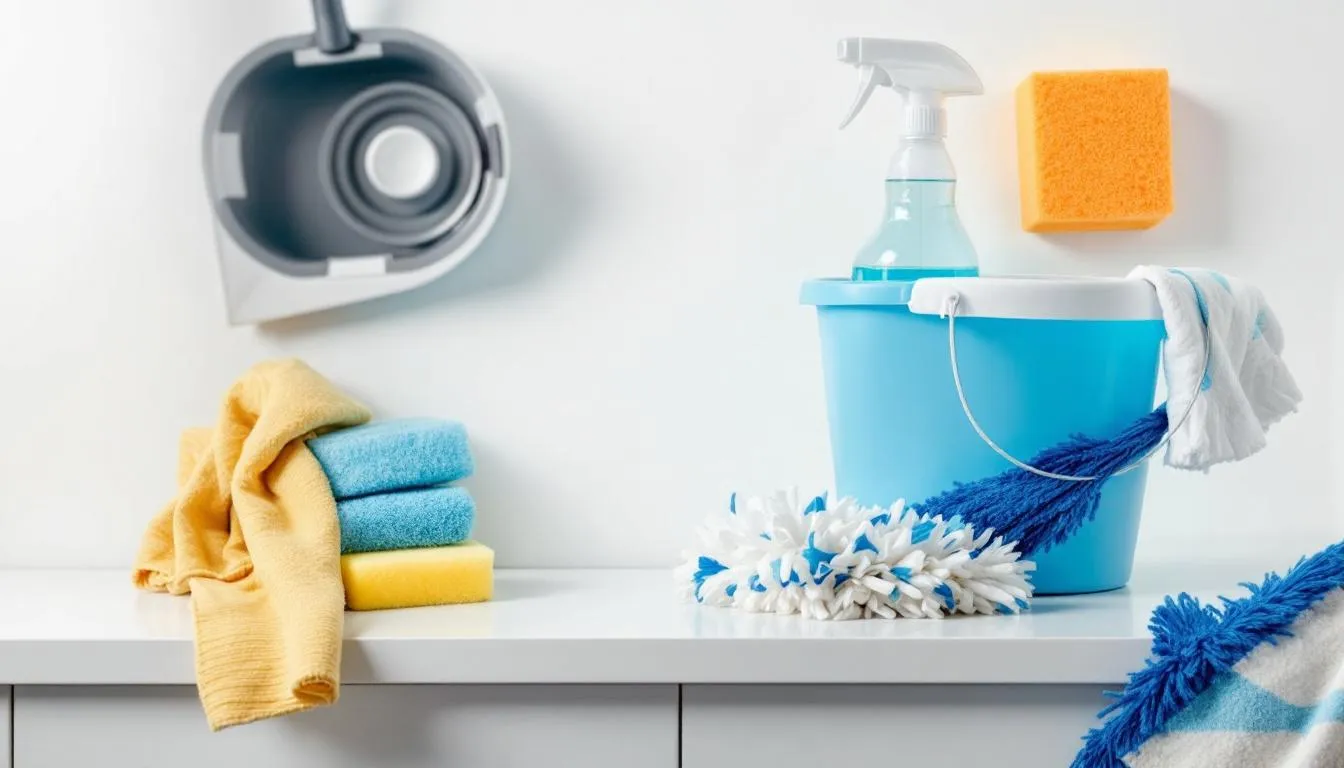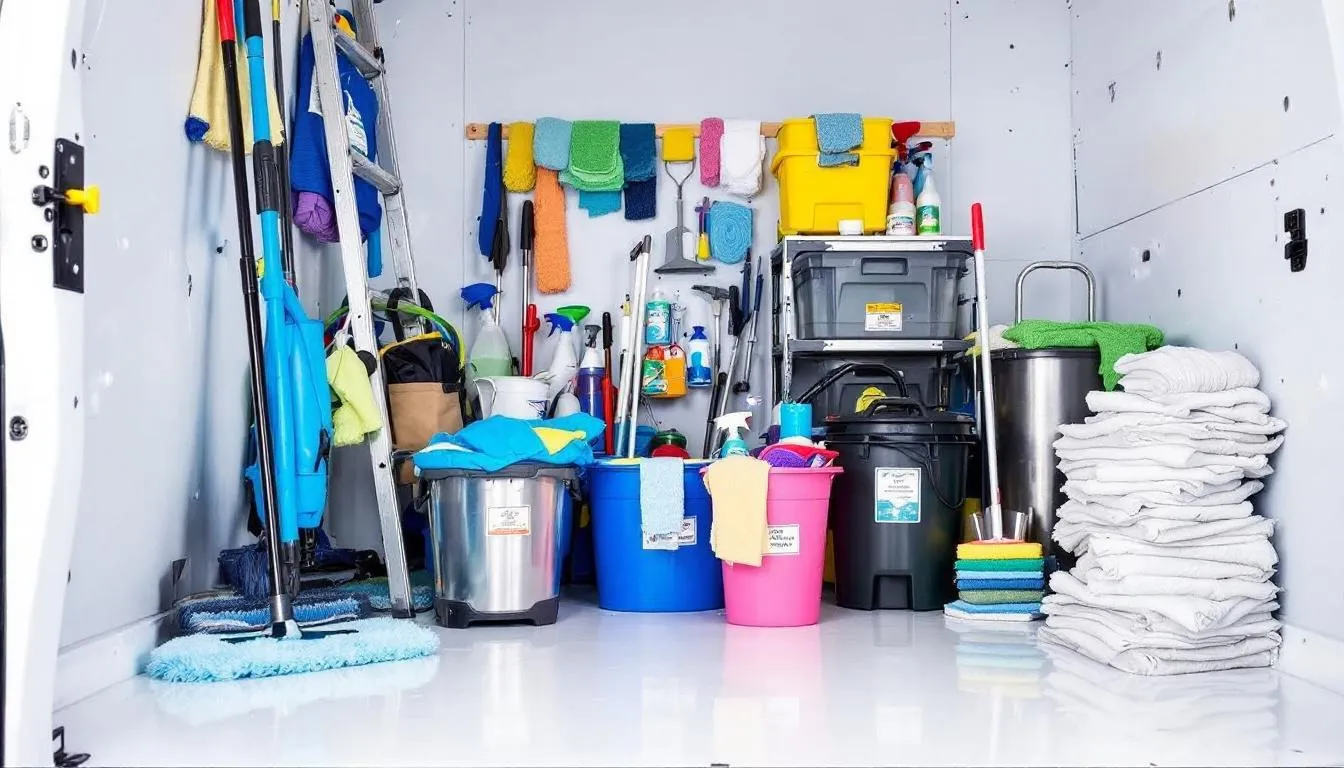Starting a cleaning business in Indiana offers one of the most accessible paths to entrepreneurship in the state. With minimal startup costs, no specialized education requirements, and consistent demand across residential and commercial markets, the cleaning industry presents an attractive opportunity for aspiring business owners. Indiana’s growing economy, particularly in cities like Indianapolis, Fort Wayne, and Evansville, creates steady demand for professional cleaning services.
Unlike many other business ventures, launching a cleaning company doesn’t require extensive capital or complex licensing procedures. The essential steps to establish your indiana cleaning business are straightforward, making it possible to launch operations within weeks rather than months. This comprehensive guide will walk you through all the steps and every aspect of building a successful cleaning business in Indiana, from initial planning to long-term growth strategies.
Whether you’re considering residential house cleaning, commercial cleaning services, or specialized niche markets, understanding Indiana’s specific business requirements and market conditions is crucial for success. The cleaning industry continues to show resilience and growth, with increasing demand for professional cleaning quality and exceptional service across all sectors.
Introduction to Starting a Cleaning Business
Starting a cleaning business is an excellent opportunity for entrepreneurs looking to enter a thriving and resilient industry. The cleaning industry continues to grow, driven by the ongoing need for professional cleaning services in both residential and commercial markets. Whether you’re interested in serving homeowners, businesses, or specialized sectors, the process of launching a cleaning business in Indiana involves several essential steps.
To ensure your cleaning business is set up for success, it’s important to understand and comply with all local regulations. This includes registering your business with the Indiana Secretary of State, obtaining any required local licenses and permits, and securing the right insurance coverage to protect your company and clients. Developing a comprehensive business plan is also crucial—it should outline your services, target market, budget, and marketing strategies. By carefully planning each stage and staying informed about industry best practices, you can build a professional cleaning business that stands out in the Indiana market and meets the needs of your clients.
Why Start a Cleaning Business in Indiana
Indiana’s robust economy provides an ideal foundation for launching a cleaning business. The state’s diverse mix of manufacturing, healthcare, education, and service industries creates consistent demand for both residential and commercial cleaning services. Cities like Carmel, Fishers, and Noblesville have experienced significant population growth, expanding the market for house cleaning businesses.

The startup costs for a cleaning business typically range from $2,000 to $6,000, making it one of the most affordable business ventures you can pursue. This budget covers essential equipment, initial cleaning supplies, basic insurance coverage, and marketing materials. Unlike franchises that may require investments of $10,000 to $50,000, starting an independent cleaning company allows you to control your investment and maintain full ownership of your business model.
Indiana’s regulatory environment favors small business growth. The state doesn’t require a specific cleaning license for standard residential or commercial cleaning services, reducing administrative hurdles and costs. Local regulations vary by municipality, but most cities and counties have streamlined business registration processes that can be completed online through Indiana’s Business One Stop portal.
The flexible nature of the cleaning industry allows you to start as a sole proprietor and scale your operations as demand grows. Many successful cleaning businesses begin with the owner providing services directly to clients before hiring employees and expanding their service area. This gradual growth approach minimizes financial risk while allowing you to perfect your service delivery and build a strong reputation.
Market research indicates that cleaning businesses can achieve steady revenue growth through recurring client relationships. Residential clients typically book weekly, bi-weekly, or monthly services, creating predictable income streams. Commercial contracts often involve longer-term agreements, providing additional stability for business growth and financial planning.
Step 1: Choose Your Cleaning Business Niche
Selecting the right niche is crucial for positioning your cleaning company effectively in Indiana’s competitive market. Each specialization requires different equipment, pricing strategies, and marketing approaches. Understanding your target market helps focus your efforts and resources where they’ll generate the best returns.
Residential house cleaning services represent the largest segment of the cleaning industry. Homeowners in affluent areas like Westfield, Zionsville, and Geist seek reliable, trustworthy cleaning professionals for regular maintenance. This market typically involves smaller, more frequent jobs with close customer relationships. Residential clients value consistency, attention to detail, and flexible scheduling to accommodate their family routines.
Commercial cleaning business opportunities exist across Indiana’s business districts. Office buildings, medical facilities, retail stores, and restaurants require regular cleaning services to maintain professional environments and meet health regulations. Commercial contracts often involve larger spaces, specialized equipment, and adherence to specific cleaning protocols. These clients prioritize reliability, insurance coverage, and the ability to work outside business hours.
Specialized cleaning services command premium pricing due to their technical requirements. Post-construction cleanup, medical facility sanitation, and hazardous material cleanup require additional training and certifications. Window washing services are particularly popular in Indiana’s urban areas, where commercial buildings and upscale homes need regular exterior maintenance.

Eco-friendly cleaning has gained significant traction among environmentally conscious consumers. Using biodegradable cleaning products and sustainable practices can differentiate your service and justify higher pricing. Many clients, particularly in college towns and progressive communities, actively seek green cleaning alternatives.
Research your local market by driving through target neighborhoods and business districts. Note the types of properties, existing cleaning services, and potential demand indicators. Check online review platforms and social media groups to understand what customers value most in cleaning services. This market intelligence will help you identify underserved niches and position your business effectively. For example, you might find a niche in offering eco-friendly cleaning services specifically for student apartments in college towns.
Step 2: Create Your Business Plan
A comprehensive business plan serves as your roadmap for launching and growing your cleaning business. This document should outline your target market, service offerings, pricing structure, and financial projections. Even if you’re not seeking external funding, a well-crafted plan helps you make informed decisions and track your progress.
Define your target market by analyzing demographics, income levels, and housing types in your chosen service area. Indianapolis suburbs like Carmel and Fishers have higher household incomes and larger homes, suggesting strong demand for regular cleaning services. Conversely, areas with more rental properties might present opportunities for move-in/move-out cleaning services.
Your pricing structure should reflect local market rates while ensuring profitability. Research competitors’ pricing through their websites, customer reviews, and mystery shopping calls. Indiana cleaning services typically charge $25-$50 per hour for residential work, with variations based on service frequency, home size, and special requirements. Commercial rates depend on square footage, cleaning frequency, and specific tasks required.
Project your startup costs and first-year expenses carefully. Initial equipment purchases typically cost $1,000-$4,000, depending on whether you focus on residential or commercial markets. Insurance costs range from $500-$2,000 annually for basic coverage. Don’t forget ongoing expenses like fuel, cleaning supplies, equipment maintenance, and marketing materials.
Set realistic revenue goals based on your capacity and market research. A solo operator can typically service 15-25 residential clients weekly, generating $2,000-$4,000 monthly revenue. Commercial contracts may offer higher individual values but require more complex scheduling and equipment. Plan for seasonal fluctuations, as some cleaning services experience slower periods during winter months.
Include a marketing budget for both startup and ongoing customer acquisition. Door-to-door marketing, online advertising, and referral programs require dedicated funding to be effective. Allocate 10-15% of projected revenue for marketing activities during your first year of operation.
Step 3: Register Your Business in Indiana
Proper business registration protects your personal assets and establishes credibility with customers and suppliers. Indiana offers several business structure options, each with different legal and tax implications. Understanding these choices helps you select the structure that best fits your goals and circumstances.
Most cleaning businesses benefit from forming a Limited Liability Company (LLC). This structure provides personal liability protection while maintaining operational flexibility and tax advantages. LLCs protect your personal assets if your business faces lawsuits or debts, which is particularly important in the cleaning industry where property damage risks exist.

To register your LLC, visit Indiana’s Business One Stop portal online or file paperwork with the Indiana Secretary of State. Be sure to complete all required forms and documentation to finalize your registration. The process requires selecting a unique business name, designating a registered agent, and paying the required filing fee. Your business name should be professional, memorable, and clearly indicate your industry focus.
If you plan to operate under a name different from your legal name, you’ll need to file a Certificate of Assumed Business Name with your county recorder’s office. This “DBA” (doing business as) registration allows you to conduct business under your chosen name while maintaining proper legal documentation.
Obtain a Federal Employer Identification Number (EIN) from the IRS, even if you don’t plan to hire employees immediately. This number separates your business and personal finances, simplifies tax filing, and is required for opening a business bank account. The EIN application is free through the IRS website and typically processes within minutes.
Register for Indiana state taxes if your business structure requires it. Most LLCs and corporations must register with the Indiana Department of Revenue. Sole proprietors typically file business income on their personal tax returns but may need separate registrations for sales taxes if they sell cleaning products directly to customers.
Step 4: Obtain Required Licenses and Permits
Indiana’s decentralized approach to business licensing means requirements vary significantly by location and service type. While the state doesn’t require a specific license for standard cleaning services, local municipalities may have their own requirements. Understanding these regulations prevents costly delays and potential legal issues. Obtaining proper licensing is essential to avoid penalties, fines, and legal complications, and it helps maintain client trust and support business growth.
Contact the city clerk’s office or county government where you plan to operate to determine local business license requirements. Many Indiana cities require a general business license for commercial operations, regardless of industry. These licenses typically cost $50-$500 annually and may require renewal at regular intervals.
Home-based businesses face additional zoning considerations. If you plan to operate from your residence, verify that local zoning laws permit commercial activities. Some residential areas restrict business operations that generate significant traffic or require commercial vehicle parking. Contact your local zoning office to confirm compliance before investing in equipment or marketing.
Commercial cleaning contracts may require additional permits or certifications. Medical facilities, schools, and government buildings often mandate specific training, background checks, or bonding requirements for cleaning personnel. Research these requirements early in your planning process, as some certifications take weeks to obtain.
Specialized cleaning services face additional regulatory oversight. Carpet cleaning, pressure washing, and chemical-based services may require occupational licenses from city or county authorities. The Indiana Department of Environmental Management regulates hazardous waste cleanup and disposal, requiring specific permits and training for those services.
Keep detailed records of all permits and licenses, including renewal dates and requirements. Create a compliance calendar to track renewal deadlines and avoid lapses that could disrupt your business operations. Many successful cleaning businesses designate one day each month to review regulatory compliance and update documentation.
Step 5: Secure Business Insurance
Insurance coverage protects your cleaning business from various risks while demonstrating professionalism to potential clients. The cleaning industry faces unique liability exposures, including property damage, theft accusations, and worker injuries. Adequate insurance coverage is essential for both legal compliance and peace of mind.
General liability insurance should be your first priority, covering property damage and injury claims related to your cleaning services. This coverage typically costs $500-$1,500 annually for basic protection. Many commercial clients require proof of liability insurance before awarding contracts, making this coverage essential for business development.

Commercial auto insurance becomes necessary if you use vehicles for business purposes. This coverage protects against accidents while traveling to client locations and may cover equipment stored in your vehicle. Standard personal auto policies typically exclude commercial use, making separate business coverage essential.
Bonding coverage builds client trust by providing compensation if employees steal from customers. While not legally required, bonding significantly enhances your marketability, particularly for residential services where clients grant access to their homes. Many insurance companies offer affordable bonding as an add-on to general liability policies.
Workers’ compensation insurance is mandatory once you hire employees in Indiana. This coverage pays medical expenses and lost wages for work-related injuries while protecting your business from related lawsuits. Even if you start as a sole proprietor, plan for this expense as you consider business growth and employee hiring.
Shop for insurance with agents familiar with the cleaning industry’s specific risks and requirements. Some insurers specialize in service businesses and offer package policies combining multiple coverage types at reduced costs. Request quotes from multiple providers and compare coverage limits, deductibles, and exclusions before making your decision.
Step 6: Set Up Business Finances
Establishing separate business finances is crucial for tax compliance, liability protection, and professional operations. Mixing personal and business finances creates accounting complications and may compromise your legal protections if you’ve formed an LLC or corporation.
Open a dedicated business bank account with a reputable financial institution. Many Indiana banks and credit unions offer small business accounts with minimal fees and helpful features like mobile deposit and online bill pay. Compare account fees, minimum balance requirements, and available services before choosing your banking partner.
Choose accounting software appropriate for your business size and complexity. QuickBooks Online, FreshBooks, and Wave offer cleaning business-friendly features like job tracking, customer invoicing, and expense categorization. Cloud-based solutions allow you to access financial information from anywhere and simplify tax preparation.
Establish a systematic invoicing process that ensures timely payment from clients. Many cleaning businesses use recurring billing for regular customers, automatically generating invoices and processing payments. Clear payment terms, multiple payment options, and prompt follow-up on overdue accounts improve cash flow and reduce collection issues.
Set up expense tracking systems that capture all business-related costs. Proper expense documentation supports tax deductions and helps you understand your true profitability. Use business credit cards or bank accounts for all business expenses, maintaining receipts and categorizing expenses appropriately.
Consider hiring a bookkeeper or accountant familiar with service businesses. Professional financial management becomes increasingly important as your business grows and tax obligations become more complex. The cost of professional accounting services often pays for itself through improved financial controls and tax optimization.
Step 7: Purchase Equipment and Supplies
Investing in quality equipment and supplies directly impacts your service delivery and long-term profitability. While startup costs should be managed carefully, purchasing reliable equipment reduces maintenance issues and enhances your professional image. Focus on essential items first, adding specialized equipment as your business grows.
Essential cleaning tools include commercial-grade vacuum cleaners, microfiber cloths, mops, buckets, and basic hand tools. Commercial vacuums offer better performance and durability than residential models, justifying their higher cost through improved efficiency and longer lifespan. Microfiber cloths provide superior cleaning performance and can be washed and reused hundreds of times.

Cleaning products should match your service focus and client preferences. All-purpose cleaners, glass cleaners, disinfectants, and floor care products form the foundation of most cleaning supply inventories. Consider eco-friendly alternatives to appeal to environmentally conscious customers and differentiate your service offering.
Transportation requirements depend on your service area and client base. Many cleaning businesses use cargo vans or pickup trucks with enclosed trailers to transport equipment and supplies efficiently. Vehicle selection should consider fuel efficiency, storage capacity, and professional appearance when visiting client locations.
Safety equipment protects you and your employees while demonstrating professionalism to clients. Nitrile gloves, safety glasses, and appropriate footwear prevent injuries and create a professional appearance. First aid supplies and emergency contact information should be readily available at all job sites.
Professional uniforms or branded clothing enhance your credibility and marketing effectiveness. Polo shirts or work uniforms with your company logo create a professional appearance and serve as mobile advertising. Many uniform companies offer embroidery services and bulk pricing for small businesses.
Step 8: Price Your Services Competitively
Competitive pricing requires balancing market rates, your costs, and desired profit margins. Understanding local market conditions, customer expectations, and your unique value proposition helps establish pricing that attracts customers while ensuring profitability.
Research Indiana market rates through competitor websites, customer reviews, and direct inquiries. Residential cleaning typically ranges from $25-$50 per hour, with variations based on service frequency, home size, and specific tasks. Commercial cleaning rates depend on square footage, frequency, and complexity, often ranging from $0.15-$0.50 per square foot.
Factor in travel time between clients when calculating hourly rates. Indiana’s suburban sprawl means significant travel time between appointments, particularly in metro areas like Indianapolis. Include travel costs and time in your pricing structure to ensure adequate compensation for your total time investment.
Create pricing tiers that accommodate different customer needs and budgets. Basic cleaning packages might include dusting, vacuuming, and bathroom cleaning, while premium services could add interior window cleaning, refrigerator cleaning, and detailed organizational work. Tiered pricing helps customers select appropriate service levels while maximizing your revenue potential.
Develop written estimates and service agreements that clearly outline included services, pricing, and terms. Professional documentation reduces misunderstandings and provides legal protection for both parties. Include policies for additional services, cancellations, and payment terms to avoid disputes later.
Consider offering discounts for long-term contracts or frequent service scheduling. Many customers prefer weekly or bi-weekly service arrangements that provide predictable income for your business. Discount structures should maintain profitability while incentivizing customer loyalty and consistent scheduling.
Step 9: Market Your Cleaning Business
Effective marketing drives customer acquisition and business growth in Indiana’s competitive cleaning market. Focus your marketing efforts on channels that reach your target customers efficiently and cost-effectively. Track results from different marketing activities to optimize your investment and improve return on marketing spend.
Door-to-door marketing remains highly effective for residential cleaning services, particularly in affluent neighborhoods like Carmel, Fishers, and Westfield. Prepare professional marketing materials including business cards, door hangers, and magnetic cards with your contact information. Schedule canvassing activities during weekday mornings or early evenings when residents are most likely to be home.
Digital marketing expands your reach and provides 24/7 customer access to your services. Create a simple website showcasing your services, service areas, and contact information. Include customer testimonials, before-and-after photos, and clear calls to action. Search engine optimization for “cleaning services [your city]” helps potential customers find your business online.
Networking with complementary businesses generates valuable referrals. Real estate agents, property managers, and home improvement contractors frequently need cleaning services for their clients. Building relationships with these professionals creates ongoing referral opportunities that can significantly boost your customer base.
Social media platforms, particularly Facebook and Nextdoor, connect you with local communities and potential customers. Share cleaning tips, before-and-after photos, and customer testimonials to build credibility and engagement. Neighborhood-focused platforms like Nextdoor are particularly effective for local service businesses.
Implement safety protocols and communicate them clearly to customers, particularly regarding COVID-19 precautions. Many customers prioritize health and safety when selecting cleaning services. Highlighting your safety measures, insurance coverage, and professional training builds trust and confidence in your services.
Building a Strong Online Presence
In today’s competitive market, a strong online presence is essential for cleaning businesses aiming to attract and retain clients. Creating a professional website is the first step—it serves as your digital storefront, allowing potential customers to learn about your cleaning company, browse your services, and easily get in touch. Your website should highlight your expertise, showcase customer testimonials, and include clear calls to action.
Social media platforms like Facebook, Instagram, and Twitter offer additional opportunities to connect with your community. By sharing cleaning tips, before-and-after photos, and special promotions, you can engage with current clients and reach new audiences. Implementing online marketing strategies such as search engine optimization (SEO) and pay-per-click advertising can further boost your visibility, ensuring your cleaning business appears when people search for cleaning services in your area.
By leveraging these digital tools and strategies, cleaning businesses can build credibility, expand their reach, and create lasting connections with clients—all of which are vital for long-term business growth.
Understanding Business Operations
Running a successful cleaning business goes beyond providing quality cleaning services—it requires efficient management of daily operations. This includes organizing staff schedules, maintaining equipment, and ensuring a steady supply of cleaning products. Staying compliant with health and safety regulations is also critical, as it protects both your employees and your clients.
To deliver exceptional service and achieve high levels of customer satisfaction, cleaning businesses should invest in ongoing staff training and stay updated on the latest cleaning technologies and eco-friendly products. Streamlining operations through effective scheduling, clear communication, and the use of business management software can help ensure jobs are completed efficiently and to a consistently high standard.
By focusing on operational excellence and adapting to industry trends, cleaning businesses can enhance their reputation, foster customer loyalty, and drive sustainable business growth.
Overcoming Common Challenges
Every cleaning business faces challenges, especially in the early stages. One of the most common hurdles is finding and retaining reliable staff, as the cleaning industry often experiences high employee turnover. To address this, it’s important to implement thorough recruitment processes, conduct background checks, and provide comprehensive training to ensure your team delivers quality service.
Managing cash flow is another frequent challenge for new cleaning businesses. Creating a detailed budget, setting clear payment terms with clients, and exploring financing options like business loans or lines of credit can help maintain financial stability. Additionally, building strong relationships with clients and consistently delivering excellent service can lead to repeat business and valuable referrals.
By anticipating these challenges and developing proactive strategies, cleaning businesses can minimize risks, maintain steady growth, and establish a solid foundation for long-term success.
Measuring Success and Progress
Tracking your cleaning business’s performance is key to making informed decisions and achieving business growth. Start by monitoring key performance indicators (KPIs) such as revenue, customer satisfaction scores, and staff retention rates. Regular financial reviews can help you identify areas where you can reduce costs or invest for greater returns.
Customer feedback is invaluable for assessing the quality of your service and identifying opportunities for improvement. Metrics like the number of new clients, client retention rates, and average revenue per customer provide a clear picture of your business’s health. Utilizing business management software can streamline operations, offer real-time insights, and make it easier to analyze these metrics.
By consistently measuring and evaluating your progress, you can refine your strategies, address any weaknesses, and build on your strengths—ensuring your cleaning business continues to grow and deliver exceptional service to clients.
Growing Your Indiana Cleaning Business
Sustainable business growth requires systematic approaches to customer retention, service expansion, and operational efficiency. Any person interested in entrepreneurship can succeed in the cleaning industry with the right support and determination. Focus on building a strong reputation for cleaning quality and customer satisfaction before attempting rapid expansion. Solid foundations support long-term success better than quick growth without proper systems.
Customer referrals represent the most cost-effective growth strategy for cleaning businesses. Satisfied customers typically refer friends, family, and coworkers when asked directly. Implement formal referral programs offering discounts or free services for successful referrals. Follow up consistently with past customers to maintain relationships and encourage word-of-mouth marketing.
Service expansion should align with customer needs and your operational capabilities. Popular add-on services include blind cleaning, appliance interior cleaning, garage organization, and seasonal deep cleaning. Each new service requires additional training, equipment, and pricing consideration, but can significantly increase revenue per customer.
Hiring employees becomes necessary as your business grows beyond solo capacity. Indiana employment laws require workers’ compensation insurance, payroll tax withholding, and adherence to wage and hour regulations. Develop clear job descriptions, training programs, and quality control systems before hiring your first employee.
Commercial contracts offer significant revenue opportunities but require different capabilities than residential services. Office buildings, medical facilities, and retail stores need reliable service during off-hours and adherence to specific protocols. Building commercial capabilities may require additional equipment, insurance coverage, and bonding requirements.
Quality control systems ensure consistent service delivery as your business grows. Develop checklists for different service types, implement customer feedback systems, and conduct regular quality inspections. As your business expands, it is important to respond promptly to client feedback or regulatory requests to maintain high standards and compliance. Maintaining high standards becomes more challenging with multiple employees but is essential for long-term reputation and customer retention.
Financial management becomes increasingly complex as your business grows. Track key performance indicators like customer acquisition cost, average customer value, and employee productivity. Regular financial analysis helps identify growth opportunities and potential problems before they become serious issues.
Streamline operations through technology adoption and process improvement. Scheduling software, GPS tracking, and mobile payment systems improve efficiency and customer experience. Investing in operational improvements often pays for itself through reduced labor costs and improved customer satisfaction.
The cleaning industry offers excellent opportunities for entrepreneurs willing to provide exceptional service and build strong customer relationships. Success requires attention to legal compliance, quality systems, and consistent marketing efforts. With proper planning and execution, your indiana cleaning business can achieve steady growth and long-term profitability.
Starting small and growing systematically allows you to perfect your service delivery while building financial resources for expansion. Focus on customer satisfaction, operational efficiency, and legal compliance to create a foundation for sustainable business growth. When expanding or making significant changes to your business, it is wise to seek professional advice, such as legal or tax advice, to ensure compliance and informed decision-making. The essential steps outlined in this guide provide a roadmap for launching and growing a successful cleaning company in Indiana’s dynamic market.